Iran, Russia And China Launch Naval Drills In Indian Ocean
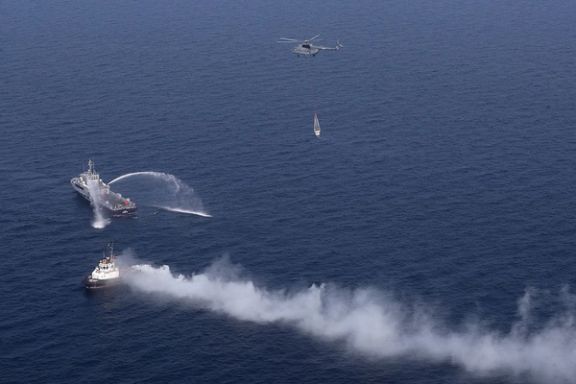
Iran, China and Russia held their third joint naval drills in the northern Indian Ocean on Friday, amid Tehran’s push to expand ties with the two Asian powers.

Iran, China and Russia held their third joint naval drills in the northern Indian Ocean on Friday, amid Tehran’s push to expand ties with the two Asian powers.
Navies from Iran's armed forces and Revolutionary Guards are taking part in the "2022 Marine Security Belt" exercise over an area of 17,000 square kilometers (6,560 square miles), Rear Admiral Mostafa Tajoldini, spokesman for the drills, told state TV.
The drills, which began in the early hours of Friday, will include various tactical exercises such as rescuing a burning vessel, releasing a hijacked vessel, and shooting at air targets at night.
The three countries started joint naval drills in 2019 in the Indian Ocean and the Sea of Oman area, Tajoldini said.
"The purpose of this drill is to strengthen security and its foundations in the region, and to expand multilateral cooperation between the three countries to jointly support world peace, maritime security and create a maritime community with a common future," Tajoldini said.
Since coming to office last June, Iran's hardline President Ebrahim Raisi has pursued a "look east" policy to deepen ties with China and Russia. Tehran joined the Shanghai Cooperation Organization in September, a central Asian security body led by Beijing and Moscow.
Foreign Minister Hossein Amirabdollahian visited China last week and Iran's president met his Russian counterpart in Moscow on Wednesday.
Reporting with Reuters

Facebook parent Meta Platforms removed a network of fake accounts that originated in Iran and targeted Instagram users in Scotland with content supporting Scottish independence, the company said on Thursday.
The network used fake accounts to pose as locals in England and Scotland, posting photos and memes about current events and criticism of the United Kingdom's government, Meta said.
The accounts organized their content around common hashtags promoting the cause, though they at times misspelled them, the company said.
In a referendum on Scottish independence in 2014, Scots voted 55%-45% to remain in the United Kingdom, but both Brexit and the British government's handling of the COVID-19 crisis have bolstered support for independence among Scots and demands for a second vote.
Meta said its investigation found links to individuals in Iran, including people with a background in teaching English as a foreign language.
It said the operation had some connections with a small Iran-based network it previously removed in December 2020, but did not provide further details on who might be behind the activity.
"We've seen a range of operations coming from Iran over the last few years," said Ben Nimmo, Meta's global threat intelligence lead for influence operations, in a press briefing. "It's not a monolithic environment."
The social media company said it had removed eight Facebook accounts and 126 Instagram accounts as part of this latest network in December for violating its rules against coordinated inauthentic behavior.
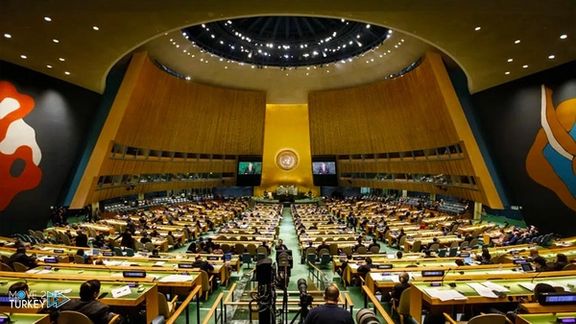
The UN General Assembly on Thursday agreed on a definition of denial of the Holocaust and urged social media companies "to take active measures" to combat antisemitism.
"The General Assembly is sending a strong and unambiguous message against the denial or the distortion of these historical facts," said Germany's UN Ambassador Antje Leendertse. "Ignoring historical facts increases the risk that they will be repeated."
While the 193-member General Assembly adopted the resolution - drafted by Israel and Germany - without a vote, Iran disassociated itself from the text over Israel's "occupation of Palestine and parts of Syria and Lebanon."
Israel's UN mission did not immediately respond to a request for comment on Iran's statement.
The General Assembly resolution spelled out that distortion and denial of the Holocaust refers to Intentional efforts to excuse or minimize the impact of the Holocaust, gross minimization of the number of the victims in contradiction to reliable sources and attempts to blame the Jews for causing their own genocide.
The resolution also said statements that cast the Holocaust as a positive historical event constitute denial, and "urges member states and social media companies to take active measures to combat antisemitism and Holocaust denial or distortion by means of information and communications technologies and to facilitate reporting of such content."
With reporting by Reuters
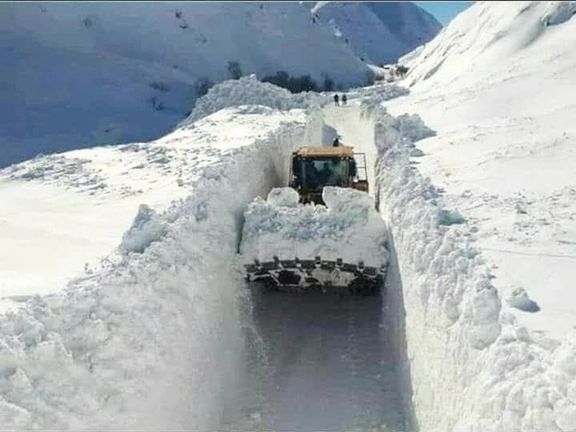
Turkey said on Thursday it will impose limited power outages to large industrial facilities and electricity plants after Iran cut gas exports for up to 10 days due to a "technical failure."
The nature of the technical problem is not clear, but Iran suffers from natural gas shortages in cold and hot temperatures when local consumption skyrockets.
Temperatures have dipped below freezing in many parts of Iran, which could have reduced gas available for export. Heavy snow has blanketed mountainous regions.
Turkey’s energy ministry said the cuts will be pre-planned to reduce disruptions. In a statement, the ministry added that it took precautions to ensure other consumers would not be impacted by the gas flow interruption.
Iranian officials had earlier warned of gas shortages in the cold winter months.
Iran needs tens of billions of dollars in investments for its sagging energy sector that also suffers from lack of advanced Western technology. Pressure at Iranian gas fields have been falling in recent years.
Years of international and American sanctions, as well as an inefficient government-controlled economy have prevented investments and technology to keep the energy sector robust.
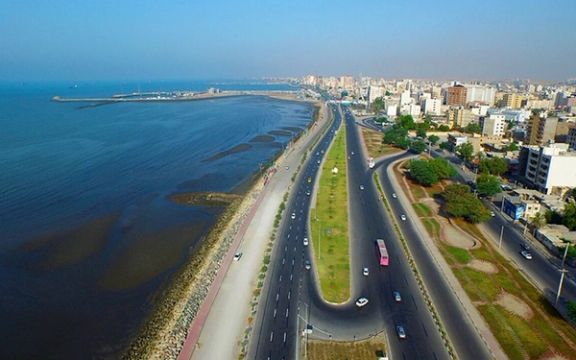
The Iranian Department of Environment says it has identified the source of the foul odor and oil spill in and around the southern city of Bandar Abbas.
The head of the environment department of Hormozgan province, Habib Masihi Taziani, said on Thursday that the bad smell that has been bothering residents in the past few days was emitted from gas condensates that reached the coastal waters of the Persian Gulf.
He said the floodwater overflowing from Kol River at a point about 40 kilometers from Bandar Abbas caused an accident on a feeding pipeline of the Persian Gulf Star Oil Company and made a large amount of oil gasses to spill into the sea.
Taziani added that operations to remove the oil spill is underway and the pipeline will be repaired as soon as the floodwater goes down.
The Persian Gulf Star Oil Company has confirmed the fracture in the pipeline and said the leaked substance can only cause minor complications such as headaches for the residents of the affected areas.
A local medical scientist, said the concentration of these gasses are not high enough to be dangerous, but asked people, particularly pregnant women, children, the elderly and respiratory patients, to stay home and close their windows.
Heavy rain and snow after months of drought have led to floods across Iran in the past week, causing deaths and damage to thousands of properties and roads.
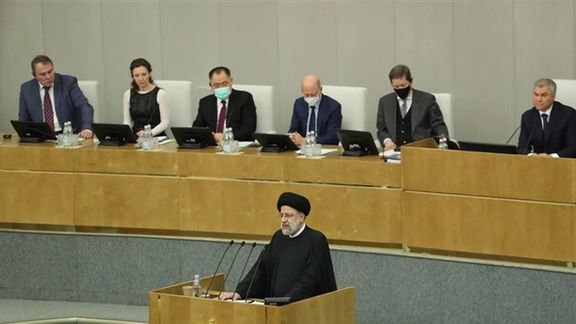
Iran’s president told the Russian Duma that the “resistance” of nations such as Iran and Russia has weakened the US and put its “strategy of domination” in disarray.
“The strategy of domination has now failed, and the America is in its weakest position,”President Ebrahim Raisi who is on an official visit to Moscow told the representatives of the Russian state Duma while emphasizing that "the desires for domination" persists and new forms of domination are on the agenda.
"The most important goal of this agenda is to weaken independent governments from within, which is pursued through economic sanctions, destabilization, the promotion of insecurity, and false narratives of events; in such a way that they try to change the place of the oppressor and the oppressed in public opinion," Raisi said.
The Iranian President also said the single "concept of resistance" brought about "failure of the policy of military occupation" and forced the US to flee Iraq and Afghanistan.
US forces are still in Iraq with a new mission of training Iraqi forces, instead of combat against the Islamic State group.
Raisi, who held a three-hour meeting with the Russian President Vladimir Putin on Wednesday, in his address to the Duma accused Western powers of forging complex plans "to send Takfiri terrorists on new missions" from the Caucasus to Central Asia.
Iranian officials use 'takfiri' to refer to Sunni fundamentalism and as a vague umbrella term to refer to Sunni dissident groups and individuals inside Iran. "Experience has shown that it is pure Islamic thought that can prevent the formation of extremism and Takfiri terrorism," Raisi said.
In a clear show of support to Russia, he also alleged that the North Atlantic Treaty Organization (NATO) is also trying to infiltrate various geographical areas under new guises. "Promoting pro-Western governments and confronting independent democracies based on national identities and traditions is part of NATO's cultural projects that reflect the hypocrisy of this diminishing pattern of behavior."
Calling sanctions "a common form of new domination", he said countering them requires a collective response from “independent nations”.
The US has threatened Russia with more sanctions if it attacks Ukraine amid a serious crisis triggered by large Russian troop concentrations on the Ukrainian border.
On the nuclear issue and the ongoing Vienna talks to restore the 2015 nuclear deal, Raisi said the Islamic Republic will never relinquish its rights but reiterated that Tehran is serious about reaching an agreement, "if the other parties are serious about lifting the sanctions effectively and operationally."
Russia is a signatory to the deal, the Joint Comprehensive Plan of Action (JCPOA) and in recent weeks has played a proactive role in the Vienna talks as a mediator between Iran and the United States which is only indirectly involved in the talks.
Calling the model of cooperation between Tehran and Moscow in Syria successful, Raisi said resistance of the Syrian people and government this has ensured the consolidation of regional security. The Iranian and Russian military interventions in Syria has killed tens of thousands of civilians.
Referring to economic relations between Tehran and Moscow, Raisi said boosting ties will strengthen the economies of both nations and regional and international security. The signing of a 20-year agreement during his Moscow trip has not materialized.
The annual volume of trade between the countries currently stands at around $3 billion. Tehran says it intends to increase it to $25 billion.